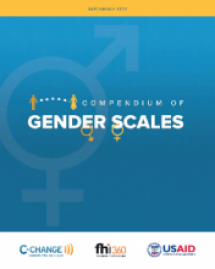Compendium of Gender Scales
The identification of appropriate gender-related measures is important for developing and evaluating interventions that aim to promote positive health outcomes by addressing the gender norms that function as barriers to health. A scale is a numerical score aggregating multiple indicators believed to reflect an underlying concept. Because there is no single “gold standard” for measuring gender norms, gender attitudes, women’s empowerment, and other aspects of gender, researchers often use multiple measures. Using a single measure is not possible because gender operates in multiple spheres and has many facets.
When a single measure is preferred, a scale combining several items creates a more valid measure than any single scale item used alone. Scales selected for the compendium have all been tested for their ability to measure gender attitudes and predict behaviors of interest, such as gender-based violence and partner reduction. The scales include those developed by working group participants as well as other scales they identified. The compendium is not exhaustive. It does not encompass all scales appropriate for studying gender and health outcomes, and it does not identify which scale is best for a specific study or evaluation. The scales included are:
- Couple Communication on Sex Scale
- Women’s Empowerment Scale
- Gender Beliefs Scale
- Gender Equitable Men (GEM) Scale
- Gender Norm Attitudes Scale
- Gender Relations Scale
- Household Decision-Making Scale
- Sexual Relationship Power Scale
Last modified: July 23, 2021
Language: English
Source: FHI 360
Year of Publication: 2011

